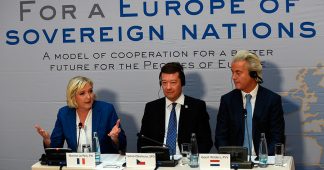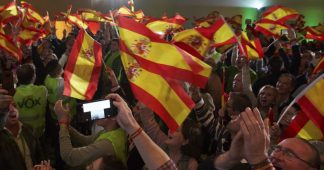Euroskeptic parties made considerable gains in the European Parliament elections, leaving the bloc’s establishment parties badly battered and searching for answers. Ultimately, analysts told RT, it illustrates how Europeans have run out of patience for politics as usual.
In the past, whenever the EU found itself in trouble, Brussels would always remedy the crisis by calling for more European integration, Dr. Werner Patzelt, a political science professor at the Technical University of Dresden, noted. And until now, Brussels always got its way.
“This time it was different,” Patzelt told RT.
Across the bloc, many people “have a feeling that there is too much integration in Europe, that there is too much government by Brussels.” This is an anti-EU feeling “that is so widely spread” which has led to the election of right-wing parties.
Migration crisis still haunts EU
Before heading into the elections, Brussels and its advocates argued that the migration crisis had been largely settled and that immigration was no longer a key issue for European voters. However, the electoral success of Austria’s conservative People’s Party, led by now-deposed Chancellor Sebastian Kurz, indicates that Europeans still see mass migration as a pressing problem. The party enjoyed a victory that can be attributed to Kurz’s “strong” policies on immigration, said Patzelt.
John Laughland, a British conservative author and historian agreed, observing that Kurz’s strong electoral showing suggests that his party was in tune with the prevailing political climate in Austria.
“Kurz has shown himself to be closer to the public mood on issues like immigration and national identity,” he said. Meanwhile, concerns over migration were also behind the right-wing push in Italy, Hungary and Poland.
‘Fed up with fake democracy’
The election has revealed an uncomfortable truth for Europe’s traditional political parties: voters are no longer satisfied with the status quo. More radical, pro-active parties are siphoning votes from the mainstream political establishment.
In Germany, “Social Democrats lost to the [left-wing] Greens, and the Christian Democrats lost to the [right-wing] Alternative for Germany,” said Patzelt.
“The Social Democrats and the Christian Democrats simply lost their effectiveness for a significant part of the electorate.”
Laughland argued that there was widespread disenchantment with establishment parties across Europe who are “effectively identical” on most issues, including European integration.
“In most European states, there is a de facto coalition, or at least a strong area of agreement, between the two or three main political parties in each country. People have had enough of this coalition of parties that pretend to be opposed to each other but are in fact in agreement on everything.”
This pattern exists all over Europe, where parties that claim to be opposed to each other are in fact the same.
For Laughland, the message to Brussels could not be more clear: “People are fed up with this fake democracy where you seem to have a choice but in fact there isn’t a choice.”
Journalist Luc Rivet echoed the statement: “The people don’t believe in the present Europe anymore, they don’t want the ‘United states of Europe,’ they want their sovereign states.”
With the pro-European bloc European People’s Party (EPP) and the Progressive Alliance of Socialists and Democrats (S&D) taking hits across the board, they will no longer have the numbers to maintain their majority in parliament. Rivet suggested that their only hope now is to form an “alliance of the losers” with the Alliance of Liberals and Democrats for Europe (ALDE).











